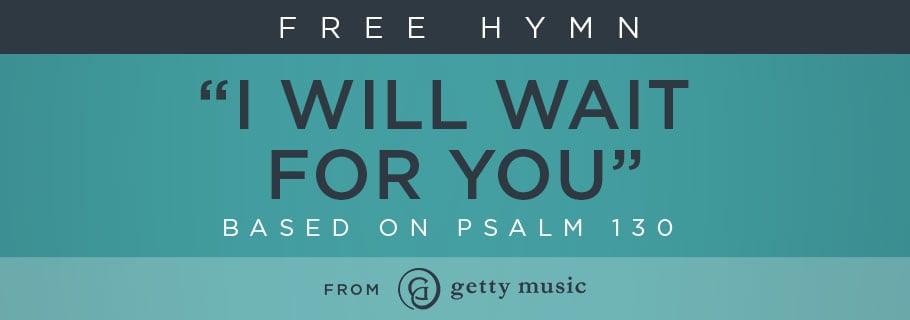Hymn Sunday is a collaboration with Getty Music, and in this post my friend Keith shares why singing the Psalms is so very necessary for our hearts. You’ll also find a video of a favorite psalm along with downloadable sheet music.
Out of the depths I cry to You,
In darkest places I will call…
For most people today—including believers—“the depths” is the last place from which a song should be sung. We reserve singing for the higher moments of life and faith. For rejoicing. For reflection. For entertainment. For religious tradition. But the Psalms remind us that singing is a sacred act divinely intended for everything we will experience in this life… including a key component of our hearts and of worship that modern services are often missing: the act of lamenting.
The song, I Will Wait for You, is very special to us. It is a setting of Psalm 130—a modern reflection of what it means to trust in God in the midst of trials. It was originally brought to us by two brilliant writers, Matt Merker and Jordan Kauflin. Stuart Townend and I added to their work our own efforts in penning a new chorus, as well as other lyrics here and there. This produced the version of the song that has already been recorded by Stuart Townend, Shane and Shane, and twice by Kristyn and myself.
Psalm 130 is often referred to as the de profundis, a Latin phrase meaning “out of the depths.” “The depths” is both figuratively and literally an expression of the deepest canyons of the ocean and of the heart—places where light cannot reach and where any hope for finding the surface above is constantly being crushed by pressure and darkness. This was a favorite psalm of everyone from Augustine to Martin Luther to Charles Wesley because it connected real life—full of angst and pain—with a real God who is ever present, especially in the depths. It reminded them then—as it reminds us now—that God invites His children not only to rejoice before Him, but also to bring before Him our struggles.
One of our goals over the next five years is to set most of the Psalms to music, rediscovering creative ways we can sing together regardless of where we are—whether soaring on the heights—in excelsis—or buried beneath the depths—de profundis.
This song is a key cog in the wheel of our new project meant to reinvigorate the congregational act of singing the Psalms. It is a heartfelt expression of the Gospel’s mirrored invitation of the Psalms to draw near to Christ not from a place of pride or privilege, but from a place of realness and brokenness, aware of the vast, impassable expanse that lies between the ocean floor and the celestial ceiling. Indeed, unless Someone higher than us spans this chasm on our behalf, we have no hope. But because Christ has already fully done this for us at the cross, we are no longer relegated to remaining quiet in the depths—we can cry out because our Savior has felt the same darkness and cold as us, emerging from our depths victorious, and creating by His grace the path of honesty and hope for us to follow. He knows what it feels like to cry out from the depths Himself.
The ancient Psalms express many things that we so desperately need in the modern age—not just in our music, but also in our very lives as they are lived together as a spiritual act of worship. The Psalms timelessly paint immutable images of the vast array of the majesty of God, speaking to His wonder and splendor, as well as the eternally creative nuance with which He speaks, moves, and employs the mysteries of time and space. But the Psalms also prompt us to behold the more transcendent, awe-inspiring aspects of his powerful deity. They acknowledge that He is also a righteous judge, longing for and guarding His people with a holy jealousy—a Sovereign whose holiness cannot tolerate evil.
Thus collectively, the Psalms portray a compellingly big picture of the God of the Bible, expressing in these observations and interactions with Him—and with life itself—every human emotion we can feel – from praise, celebration, shouting, and dancing, to crying, anger, repentance and lament. This is indeed a masterful Psalm of lament—a healthy outlet of faith and expression that we often lack in the modern Church, for which we needlessly suffer. Plainly stated, our modern worship experiences often leave out the biblical, healthy act of lament. We have lost the sacred invitation to cry out from the depths.
Our hope is that this hymn speaks to many people and allows us all to see with fresh eyes the clear invitation from scripture to spend time waiting on the Lord… no matter how deep in the depths we may be.










